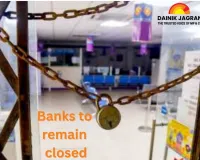Credit card payment delay may attract ₹1,000 penalty:Your CIBIL score does not drop instantly
Digital Desk
.jpg)
If you delay paying your credit card bill or loan installment by even one day, you can be fined anywhere from ₹100 to ₹1,000. However, a delay of less than 30 days in bill repayment does not immediately drop your credit score. According to experts, credit rating agencies and banks differentiate between short delays and long defaults.
Typically, delays of less than 30 days are not reported to credit bureaus. All banks and credit unions usually provide a grace period of 3 to 7 days. If payment is made during this period, your account is not flagged as 'late payment'. This means that if you pay only one day late, there will be no direct negative impact on your credit score at that time.
Experts believe that even if credit bureaus do not report a delay of one or two days, continuous small delays can negatively impact your CIBIL score in the future. Banks and lenders can flag such delays on their internal systems.
Repeated one-day delays mean that your past payment behaviour history is poor. This can adversely affect loan or credit card applications in the future.
A CIBIL score is a three-digit number that shows your credit history, i.e., your borrowing record. This score ranges from 300 to 900. The higher the score, the more trustworthy a customer banks, NBFC companies, or other financial institutions consider you to be.
CIBIL score can be checked for free on the official CIBIL website www.cibil.com. However, this facility is available only once a year. To check the CIBIL score more than once from the CIBIL website, one has to take a monthly subscription plan of ₹550. Additionally, many banking service aggregators also provide the facility to check CIBIL scores.
4 important things to maintain a credit score
· Utilize only 30% of the card limit: Always keep expenses up to 30% of the limit. For example, on a limit of ₹1 lakh, spend only up to ₹30,000.
· Apply to increase card limit: If your income is stable and your payment history is good, request that the bank increase the limit.
· Distribute expenses across different credit cards: If you have more than one credit card, distribute regular bills across 2-3 cards. This will prevent the utilization ratio of a single card from increasing.
· Set up credit card spending alerts: Set up the card's mobile app or SMS alerts so that you receive an alert if your spending goes above 30%.
4 steps to avoid late payments
· Set up auto-pay: Set up auto-debit for EMI or bills, so payments are not late.
· Set reminders: Use apps like Google Calendar or bank alerts.
· Check account balance: Ensure sufficient balance in the account before payment, to avoid overdraft.
· Immediate payment: If repayment is late, pay instantly.
.jpg)


.jpg)




.jpg)


1.jpg)
